- Home
- Shirley McKay
Martinmas Page 7
Martinmas Read online
Page 7
‘And I him.’
‘You would. He was not bad. The things that he sold – the daggers and cups – were not real, you know,’ Malcolm said. ‘He did not really take them from a Spanish ship. There is a blacksmith makes them for him in Dundee. He never saw the wreck of the Gran Grifon, or took the knife from a dying soldier. It was all made up, to help him sell the things. So I do not see–’ The boy broke off in tears.
‘What do you not see?’ asked Hew.
‘I do not see why the ghost would come for him. He only told a lie. He never did it harm.’
‘Nor do I see why.’ Hew put his arm round him. ‘I do not think it did.’
‘Truly?’ Malcolm looked at him. ‘Then why did he cry out “Dead Spaniard”? Was it Thomas Crowe, put a curse on him?’
Hew shook his head. ‘It was not Thomas Crowe. I do not know why your father said those words. But you have my promise that I will find out.’
He was late home. And though he wanted very much to discuss the case with Frances, he found her strangely cold. She would not look at him. And when he asked for Flora, she said, ‘Oh, she is in bed now. Do not disturb her,’ which hurt him, for she knew he liked to give a last kiss to the child, at whatever hour, before he went to sleep.
‘I am sorry to be late,’ he said. ‘Something happened in the town.’
Frances said, ‘It always does.’
He tried to make amends, with no clear understanding what his fault had been. ‘I left you on your own, at killing time,’ he said.
‘That is of no consequence.’
‘Did it not go well?’
‘The slaughter is done, if that is what you mean. We have enough meat to see us through the winter. The candlemaker will come to visit us on Thursday. It is a busy week for him.’
He asked, ‘What is it, then?’
‘What is what?’
‘The matter.’
‘There is no matter, Hew.’
He took her hands in his. ‘Shall we begin again? Plainly, there is.’
Frances pulled away from him. ‘I went into the library,’ she said.
‘And?’
‘I wanted to begin a new account book, because today is Martinmas.’
‘Did you not find one?’ he said.
The look she gave him made him thankful when she turned away. ‘I do not like to tell you what it was I found,’ she said. ‘Oh, Hew, I had not thought of you, that you had a taste for such things.’
‘As account books?’ he replied, baffled at the words.
‘How can you!’ she cried. ‘How can you make light of it, in such an unkind way. I mean, you know I mean, that cruel and vile obscenity you will say is verse.’
‘Oh,’ said Hew at last, ‘you mean the Spanish scourge.’
‘How can you stand and smile at it, and show no scrap of shame? I thought I knew you, Hew.’
‘You do. I scarcely can believe you thought I liked that stuff. It is not mine,’ he said.
Relief, and confusion, diluted her anger. ‘Oh! Then it must belong to Gavan Baird. I did not think that it could be his.’
He answered, with a heavy humour, ‘You did not think it could belong to the librarian. And yet you were convinced that it must be mine?’
‘Do not twist my meaning, Hew. I am not a student you dispute with in your class. I did not think that Gavan Baird, being the librarian, would dare to bring such filth into his master’s house. But, if he has, he must be dismissed from here at once.’
‘Frances, it was not Gavan Baird. I took it from a student at the college. It has caused, to this time, more trouble than you can possibly imagine. I am truly sorry that I brought it home. I did not think, nor meant for you to see it.’
‘Then it is not yours, though you brought it here?’ Frances said, perplexed.
‘It was never mine. And I do deplore it as a hateful thing.’
‘Then I am ashamed, for thinking ill of you.’
‘You should be.’
‘But you should be ashamed for bringing it back home. It was not responsible. We have Flora and the servants here.’
‘Flora is a babe, and the servants cannot read,’ he reminded her.
‘Even so, I cannot help but think it is an evil influence. It is a hateful thing. Can we burn it, please?’
‘We shall. We will not have its evil come between us here,’ he agreed. Could the paper be at the heart of this? Like a kind of charm that bore its own malevolence, over and above the meaning of its words? That was superstition, and Hew pushed it from his mind. He fetched the paper down and put it to the flame. And burning it, indeed, appeared to break its spell, for soon they were together, sitting in the firelight, peaceful once again. ‘Are the stories of the Spanish torments true?’ Frances asked.
He answered honestly. ‘The Inquisition has inflicted countless cruelties. But I think also that the accounts may be exaggerated. This writing has sprung up to celebrate the triumph of the English fleet. It is more heroic when the enemy is monstrous. And people like to read that kind of stuff.’
‘I do not like it,’ Frances said, ‘when we look for glory in a man’s defeat. It should be enough, to know that we have won, and God is on our side. I think it is shameful, and small, to make foul of the tune of the good Valiant Soldier, and dress in Dead Spaniard, and such.’
Hew stared at her. ‘Say what, my love? Dress in what?’
‘Dead Spaniard. It is the latest colour worn in London now.’
‘Dead Spaniard is the name for a kind of cloth?’
‘For the colour,’ Frances told him. ‘It is all the vogue. My uncle sells the stuff. My cousin Mary has a gown of it. She writes it is a drab and dirty shade, but people like to wear it all the same. Thank God, we do not find it in Will Dyer’s shop.’
‘I love you, Frances Phillips,’ Hew declared, and kissed her. Frances was a little pleased, and still a little vexed. ‘I know you do,’ she said. ‘The question that remains is do I still love you? Shall we go to bed now, and find out?’
Postscript
Dead Spaniard
‘a proof that spirits and ghosts do oftentimes appear’
On November 26, 1588, the minister James Melville was woken from his bed and called to the harbour at Anstruther, where a ship was docked. The ship had sailed from Orkney, and the sailors aboard, who were more than two hundred and fifty, were survivors of the Gran Grifon, the flagship of the Spanish fleet. The men were in a desperate state, and posed no kind of threat. They were received by the civic and the Kirk authorities with civility and kindness, and responded gratefully. James Melville preached a sermon to them on their errors, which was well received. Their commander was extended every courtesy, and proved himself a credit to his rank. The rest were watched, and cared for, on their ship. The captives gave no trouble, and they wanted none. On one occasion only did they cause concern, when it was reported that one among the crew was missing from his berth. The missing man was Andres del Castillo, a young sailor born to a gentle family, who had been wounded badly in the wreck, when a piece of wood had pierced his side. If he were alive, he could not be far. A search was made, but nothing of him found. His captain thought he might have fallen overboard.
For the rest, they were quiet, honest men. If they had ever brought with them the vengeful tools of torment named in the reports, then they had gone down with the Gran Grifon. James Melville found them Christian, too, at heart. At St Andrews, he acquired a list of all the ships, and where they had come down, to bring back to their captain, who was keen for news. The minister was moved by how much it affected him. ‘They are not monsters, at all,’ he said to Hew when he met him in the street. ‘But just the same as you and I.’
The college settled down for the winter term. Malcolm Crabbe had left, but promised to come back, and Thomas Crowe returned from his convalescence, with a little flesh upon his bones, and a little colour on his cheeks. The last fair in the year came on St Andrew’s day. And early on that day, before the sun was up, A
ndres del Castillo came around the coast, looking for the town where the pilgrims used to come. The cathedral church had fallen in decline. But that was not the kirk that caught his eye. He was drawn instead to the chapel of St Salvator, with its steeple spire that towered above the town, and its aspect open to the quiet street. And there it was he chose to say his final prayers.
Hew was in the turret tower with Giles, when Thomas Crowe came bursting through the door. His eyes were shining. ‘He is there! The Spaniard is there! In the chapel, now. Come, come and see!’
‘You were telt,’ scolded Giles, ‘not to go in there.’
Hew pleaded, ‘No more ghosts.’
‘He is not a ghost. He is flesh and blood.’ Thomas tugged his cloak. ‘Come, will you, see!’
Coming to the kirk, Hew saw Andres kneeling in the place where there was an altar in the Catholic church. He rose at their approach, holding out his hands, opening his mouth as though he meant to speak. Blood began to spring from the wound on his side, and he laced his fingers, closing it again, falling to the ground. As Giles ran to catch him, Thomas said clearly, ‘Now he is dead.’
There was nothing, after all, remarkable in that. Andres was the man missing from the ship, thought by his friends to have fallen in the sea. There was nothing strange in a foreign sailor, so far from his home, coming here to die in a holy place. The steeple of the chapel was a beacon to the faithful. It was meant to be. And if he did resemble someone Thomas Crowe had seen, or had once imagined seeing in a dream, that was natural too, as everyone agreed, for all the Spanish sailors looked the same.
Notes
The epigraphs to parts 1–4, and to the Postscript, are taken from the 1596 edition of Lewes Lavater, Of Ghosts and Spirits, Walking by Night, with some slight modernizations.
The epigraph to ‘Martinmas’ is Lavater’s version of the Aeneid, Book 4 384f. [Dido threatening to haunt Aeneas]
The ‘New Ballet of the straunge and most cruelle Whippes’, by Thomas Deloney, was printed in London, 1588.
Glossary
(A)feart afraid
Ah I
Ain own
Allhallowday All Saints’ Day
An and; if
Awbody anybody
Bailie a burgh magistrate
Bairn a child
Bannock flat bread or pancake
Bellox testicles
Belly-thraw a stomach ache
Black stane black stone, on which students sat during public examinations at the ancient universities
Board a table
Butts targets for archery practice
Cadger an itinerant salesman
Clyster an enema
Compear to appear before a court
Convicted convinced
Cuddoch a young cow or ox
Dae do
Dennar dinner
Dinna/e don’t, do not
Doleaunce condolence
Epidemy an epidemic
Et tu [Latin] ‘you too’
Fash [oneself] to get worked up, annoyed
Fermer person in charge of an infirmary
Fermary an infirmary
Fidge to be restless
Flesher a butcher
Flux diarrhoea
Frae from
Gang to go
Gar to cause something to be done
Gie to give
Goited bunkered
Green to desire, yearn for
Guid good
Guidwife a wife in her role as mistress of the house
Hae have
Ignosce [Latin] forgive (imp.) [lit. do not look into]
Immissa est pila in arenum [Latin] The ball is stuck in the sand
Impressive impressionable
Jakes a latrine
Keek to peep
Ken to know
Kirk the reformed Church of Scotland; [kirk] a church
Kittil fidgety
Laich low
Laich house a cellar
Limmar a reprobate
Loun a rascal
Mair more
Maist most
Martinmas November 11, the feast of St Martin; name given to the first term of the academic year at St Andrews University
Maun must
Mauna must not
Medicinar a doctor
Mind to remember
Minnie a child’s name for mother
Niver never
Peste plague
Physick medicine
Plat a dish
Poffle a small piece of land
Quartan fever a fever which recurs every fourth day
Quotidian recurring daily, every 24 hours
Reek to smoke; to emit; to shed blood freely
Regent a university teacher, who took a class of students through the four year course in arts and philosphy
Rumpill hind quarters
Salve! [Latin] Greetings!
Sic such
Stoup a pitcher
Subjectable susceptible
Telt told
Tertian a third year student
Tertian fever a fever which recurs every other day
Thocht thought
Vennel an alley
Vomitary an emetic
Wam stomach
Wattir-kail vegetable broth
Wha who
Whisht hush
Wid would
Yisterday yesterday
ALSO AVAILABLE IN THE CALENDAR OF CRIME SERIES
Candlemas
http://amzn.to/2aICshV
On Candlemas eve an apprentice candle maker finds his master, John Blair dead in his workshop, and the evidence points to the surgeon Sam Sturrock. Enlisted by Sturrock's desperate apprentice, Hew Cullen, together with his friend and physician Giles Locke, finds himself drawn into the investigation to uncover the truth of the matter. At first it seems like Blair's death is the result of reckless surgical practice, but as Hew delves deeper into the life of the candle maker he discovers a web of extortion and deceit.
John Blair was a man with many enemies...
Whitsunday
http://amzn.to/2atebrt
When a Lord Justice is found dead within the grounds of St Leonard's College an unfortunate group of students and teachers take it upon themselves to dispose of the body. However, when the supposed corpse vanishes from its hiding place it quickly becomes apparent that not all is as it seems at the College. Rumours of corruption, blackmail, murder and witchcraft begin to circulate as an invisible power struggle between rival colleges and a group of commissioners unfolds in St Andrews.
Before long, Hew Cullan and Giles Locke are reluctantly dragged into the ensuing melee of investigation and accusation. Hew must not only protect an innocent man accused of murder, but also salvage the teetering reputation of a respected commissioner.
Lammas
http://amzn.to/2d7bvQT
Lammas day, a day of celebration for some.Elspet, a serving girl at the harbour inn has been told for years by the inn's owner, Walter Bone, that she is ugly and that no man will ever want her. Then, after years of being shut away from the world she unexpectedly catches the attention of a young labourer and realises she has been lied to all these years. She meets her lover in secret at the Lammas day fair, but her dalliances do not go unnoticed . . .
Hew Cullan finds himself retained by a man with a mind for murder. Walter Bone makes clear his intent to kill Elspet's lover, and seeks Hew's help to ensure his will is upheld when he is inevitably hanged for the act. But his jealousy has unexpected consequences. When Elspet disappears without a trace several innocent fair-goers and patrons are dragged into a web of suspicion, rumour and accusation. It falls to Hew to unravel the twisted threads and figure out the truth of the matter.
Martinmas
In St Salvator’s college at the start of the academic year a young student claims that he has seen the ghost of a Spanish soldier. Giles and Hew dismiss this as the fevered product of a wild imagination; the students are unsettled b
y a spate of violent storms, and fears of the apocalypse readily resurge. In the close confines of college, they can be contained. But when a merchant dies, on the feast of St Martin known as ‘killing time’, with the words ‘dead Spaniard’ the last upon his lips, the terror of the students spills out to the streets, and Hew is called upon to rid the town of ghosts.
Yule
Despite prohibitions on celebrating Yule, the old traditions still persist among the tenant farmers on Hew’s estate at Kenly Green. Hew defends a tenant against both Kirk and Crown when a violent accident befalls an unwelcome guest who has turned up uninvited to the feast.
1588: A Calendar of Crime
A Novel in Five Books
http://amzn.to/2dZSIYk
A novel in five books featuring:
A grisly murder
A vanishing corpse
A secret romance
A ghostly tale for Halloween
An innocent accused
1588. It is a dark and turbulent time. Scotland’s queen has been executed, the Spanish king seeks revenge, and the people of St Andrews cling desperately to the rhythm of the old ways.
The ancient burgh is renowned throughout Europe as a seat of Church and learning but it is also a town full of suspicion, and murder. sets her intriguing and sometimes comic tale around the key points in the: the four quarter days of and the feast day of Yule.
When the first victim is discovered on, and, is called upon to investigate; the dark side of the sixteenth century comes alive in a rich tapestry infused with the textures of history and, woven by a master crime writer.
ALSO AVAILABLE IN THE HUW CULLEN SERIES
Hue & Cry
http://amzn.to/1nSZ9RU
‘A gripping and welcome addition to the growing genre of historical crime fiction’
Waterstone’s Books Quarterly
‘An elaborate, closely plotted tale that combines extensive research with high drama’
The Herald
1579, St. Andrews. A thirteen-year old boy meets his death on the streets of the university city of St. Andrews and suspicion falls upon one of the regents at the university, Nicholas Colp. Hew Cullan, a young lawyer recently returned home from Paris, uncovers a complex tale of passion and duplicity, of sexual desire and tension within the repressive atmosphere of the Protestant Kirk and the austerity of the academic cloister.

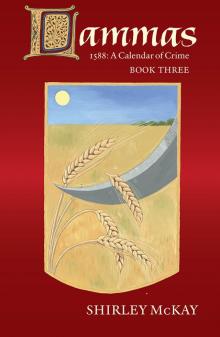 Lammas
Lammas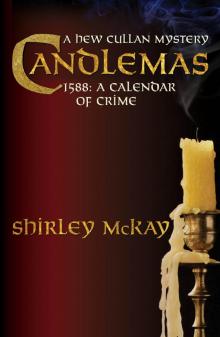 Candlemas
Candlemas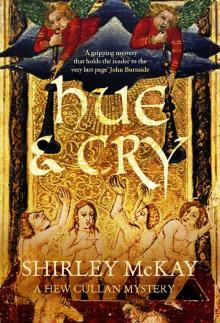 Hue and Cry
Hue and Cry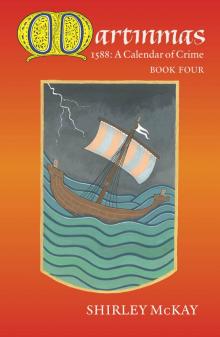 Martinmas
Martinmas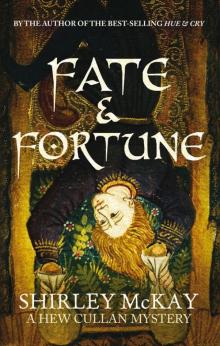 Fate and Fortune
Fate and Fortune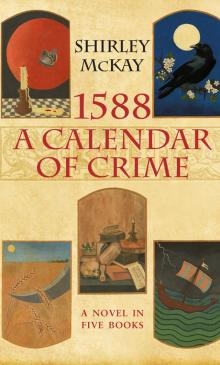 1588 A Calendar of Crime
1588 A Calendar of Crime Time and Tide
Time and Tide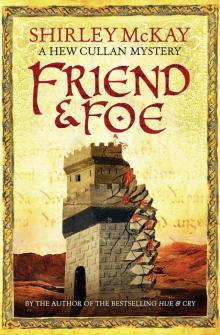 Friend & Foe
Friend & Foe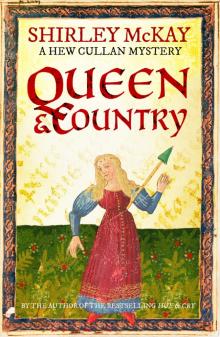 Queen & Country
Queen & Country